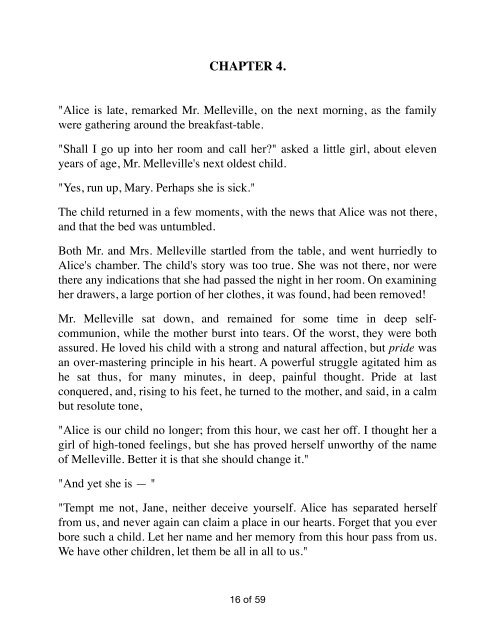The Prodigal Daughter
Character building stories by Timothy Shay Arthur (June 6, 1809 – March 6, 1885) Timothy Shay Arthur has done more for American literature than any one other person. His name will be remembered and loved, when those of his critics will be forgotten, together with their productions. I doubt if there is another man in the country who has done such a vast, such a measureless amount of good with the pen. There is probably not another American writer who has produced so much, as Arthur." "Arthur was the most popular and widely read author of his times!""All of the books from the pen of Timothy Shay Arthur are most interesting, and of a high moral and useful tone. To read any of them, must improve the character and the conduct. Mr. Arthur's works are all wholesome; they inculcate morality and purify the feelings — by tastefully illustrating the beauties of virtue, and the iniquities of vice. "His works will be read with interest by all the admirers of wholesome novels, and will be seized on with avidity by the thousands of readers who prefer Mr. Arthur's useful and instructive sketches — to the flimsy novels which overstock the market. To Mr. Arthur the public are indebted for a species of composition that while it affords delight, conveys at the same time, many moral and practical lessons for life." (Editor, 1855)
Character building stories by Timothy Shay Arthur (June 6, 1809 – March 6, 1885) Timothy Shay Arthur has done more for American literature than any one other person. His name will be remembered and loved, when those of his critics will be forgotten, together with their productions. I doubt if there is another man in the country who has done such a vast, such a measureless amount of good with the pen. There is probably not another American writer who has produced so much, as Arthur."
"Arthur was the most popular and widely read author of his times!""All of the books from the pen of Timothy Shay Arthur are most interesting, and of a high moral and useful tone. To read any of them, must improve the character and the conduct. Mr. Arthur's works are all wholesome; they inculcate morality and purify the feelings — by tastefully illustrating the beauties of virtue, and the iniquities of vice.
"His works will be read with interest by all the admirers of wholesome novels, and will be seized on with avidity by the thousands of readers who prefer Mr. Arthur's useful and instructive sketches — to the flimsy novels which overstock the market. To Mr. Arthur the public are indebted for a species of composition that while it affords delight, conveys at the same time, many moral and practical lessons for life." (Editor, 1855)
You also want an ePaper? Increase the reach of your titles
YUMPU automatically turns print PDFs into web optimized ePapers that Google loves.
CHAPTER 4.<br />
"Alice is late, remarked Mr. Melleville, on the next morning, as the family<br />
were gathering around the breakfast-table.<br />
"Shall I go up into her room and call her?" asked a little girl, about eleven<br />
years of age, Mr. Melleville's next oldest child.<br />
"Yes, run up, Mary. Perhaps she is sick."<br />
<strong>The</strong> child returned in a few moments, with the news that Alice was not there,<br />
and that the bed was untumbled.<br />
Both Mr. and Mrs. Melleville startled from the table, and went hurriedly to<br />
Alice's chamber. <strong>The</strong> child's story was too true. She was not there, nor were<br />
there any indications that she had passed the night in her room. On examining<br />
her drawers, a large portion of her clothes, it was found, had been removed!<br />
Mr. Melleville sat down, and remained for some time in deep selfcommunion,<br />
while the mother burst into tears. Of the worst, they were both<br />
assured. He loved his child with a strong and natural affection, but pride was<br />
an over-mastering principle in his heart. A powerful struggle agitated him as<br />
he sat thus, for many minutes, in deep, painful thought. Pride at last<br />
conquered, and, rising to his feet, he turned to the mother, and said, in a calm<br />
but resolute tone,<br />
"Alice is our child no longer; from this hour, we cast her off. I thought her a<br />
girl of high-toned feelings, but she has proved herself unworthy of the name<br />
of Melleville. Better it is that she should change it."<br />
"And yet she is — "<br />
"Tempt me not, Jane, neither deceive yourself. Alice has separated herself<br />
from us, and never again can claim a place in our hearts. Forget that you ever<br />
bore such a child. Let her name and her memory from this hour pass from us.<br />
We have other children, let them be all in all to us."<br />
16 of 59

















